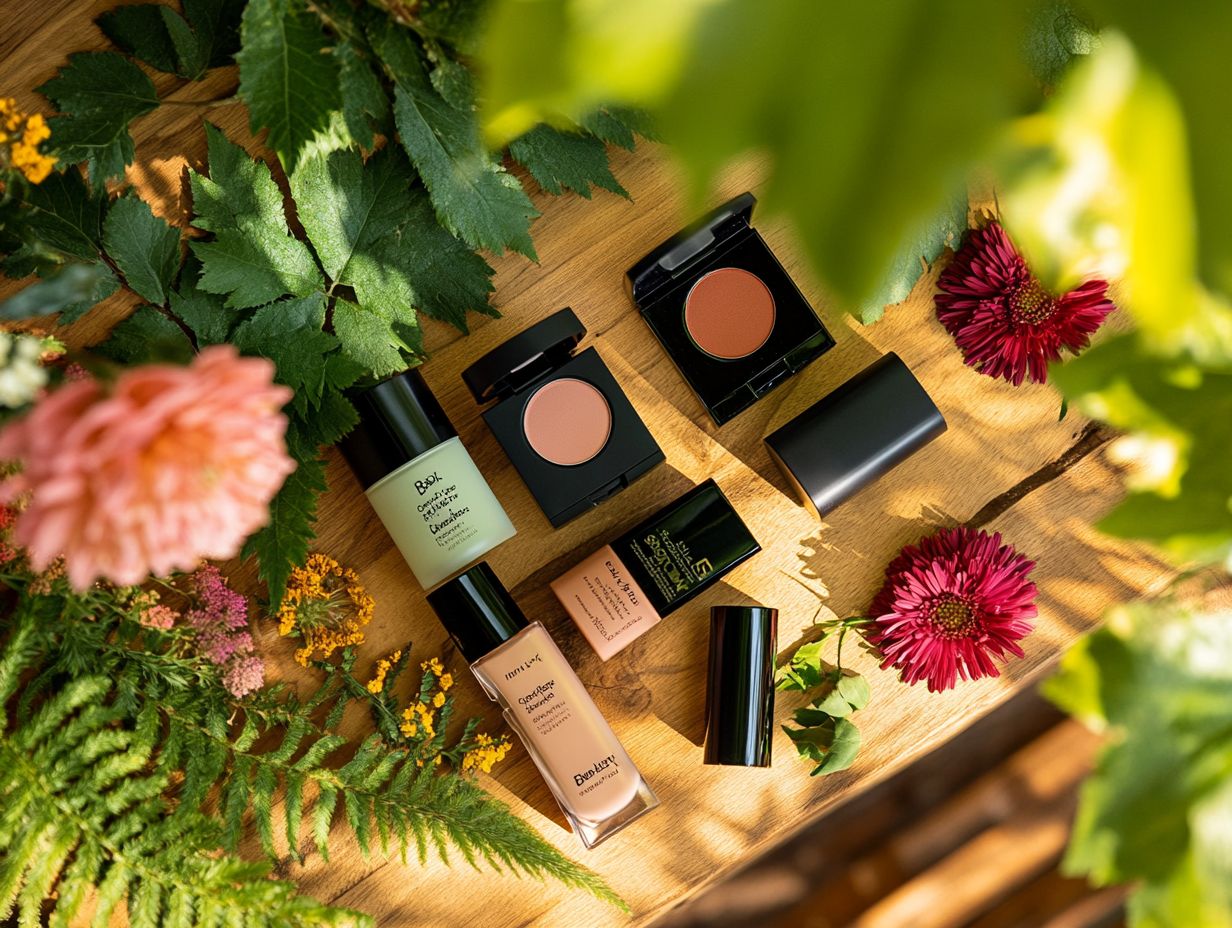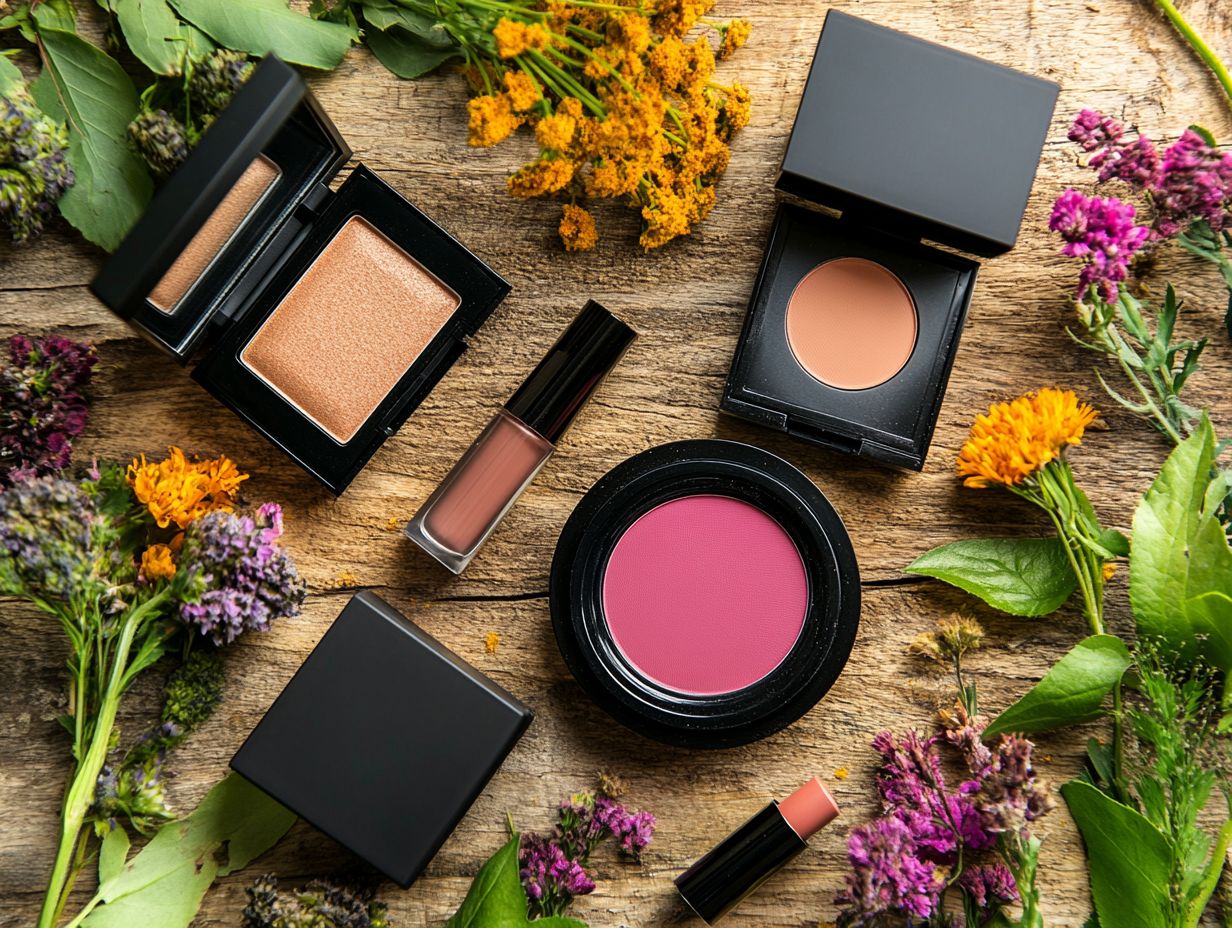Navigating the world of beauty can be overwhelming, especially with the growing buzz around organic and natural makeup. Understanding the distinction between these two can significantly impact your skincare and makeup choices.
This article explores the numerous benefits of organic makeup, highlighting how it nourishes your skin and enhances your beauty. From in-depth reviews of top organic brands to essential ingredients to look for, we guide you on choosing the right products and incorporating them into your daily routine.
Join us on this journey to a healthier, more radiant you!
Key Takeaways:

Understanding the Difference Between Organic and Natural Makeup
Understanding the distinction between organic and natural makeup is essential for consumers seeking to enhance their beauty routines while prioritizing skin health.
In a time when conscious consumerism is gaining traction, individuals are becoming increasingly selective about the products they apply to their skin. Organic makeup, often certified by reputable organizations, emphasizes the use of ingredients sourced from farms that eschew synthetic pesticides and fertilizers, thereby aligning with both skin health and ecological sustainability. Brands that prioritize these formulations, such as RMS Beauty and ILIA, typically provide transparent ingredient lists, enabling consumers to make informed choices.
Conversely, natural makeup may include both plant-based components and synthetic additives, which can create confusion regarding efficacy and safety. A thorough understanding of these nuances ensures that the selected products not only enhance appearance but also contribute to long-term skin wellness, thereby reducing the risk of irritations and allergic reactions.
Benefits of Using Organic Makeup
Utilizing organic makeup provides a multitude of benefits that address both personal health and environmental concerns, positioning it as a prudent choice for discerning consumers.
Organic makeup is formulated with ingredients that are beneficial for the skin, nourishing and protecting it while adhering to nontoxic beauty standards that exclude harmful chemicals.
Furthermore, numerous organic makeup brands emphasize environmental sustainability by employing eco-friendly packaging and processes, thereby contributing to a healthier planet.
How Organic Makeup Benefits Your Skin

Organic makeup offers numerous benefits for the skin, owing to its formulation of natural ingredients and effective combinations designed to enhance skin health. Unlike conventional cosmetics, organic makeup avoids harmful chemicals and incorporates skin-friendly ingredients that nourish, hydrate, and protect the skin. This emphasis on ingredient safety not only promotes a radiant complexion but also minimizes the risk of allergic reactions and irritations commonly associated with synthetic products.
Ingredients such as botanical extracts, essential oils, and organic minerals work synergistically to address specific skin concerns, including acne, dryness, and signs of aging. For example, the inclusion of shea butter and jojoba oil aids in moisturizing and soothing irritated skin, while antioxidants like green tea extract help combat free radicals, contributing to a youthful appearance.
Customers frequently express satisfaction with these products, noting significant improvements in skin texture and clarity. For those seeking a reliable option, brands such as RMS Beauty and 100% Pure have garnered positive reviews for their innovative formulations, demonstrating that organic makeup not only enhances beauty but also supports overall skin health.
Top Organic Makeup Brands
A diverse array of leading organic makeup brands has emerged, gaining recognition for their commitment to quality, sustainability, and ethical practices. Brands such as ILIA, RMS Beauty, and Kosas have set themselves apart by providing cruelty-free cosmetics that emphasize skin health and incorporate vegan ingredients in their formulations.
These brands are frequently acknowledged for their innovative strategies in developing high-performance cosmetics that cater to a wide range of beauty routines and consumer preferences.
Detailed Review of Each Brand
This section will provide a comprehensive review of various organic makeup brands, with an emphasis on their product offerings, ingredient safety, and customer feedback. Brands such as 100% Pure, Merit Beauty, and Thrive Causemetics each offer unique and effective formulations tailored to a variety of skin types and preferences.
By examining customer reviews and assessing ingredient transparency, we can derive valuable insights into the efficacy and performance of these organic products.
100% Pure presents a diverse array of makeup and skincare items, distinguished by their use of fruit-based pigments and a commitment to eco-friendly practices. The brand has received acclaim for its innovative foundations and vibrant lip products.
In contrast, Merit Beauty is recognized for its minimalist approach, delivering high-quality essentials designed for effortless application. Customers frequently praise the luxurious feel of their products on the skin.
Thrive Causemetics distinguishes itself with a collection aimed at enablement, offering high-performance items that are both vegan and cruelty-free. Customer reviews often commend their volumizing mascara and creamy concealer for their enduring effectiveness.
Each brand adheres to rigorous organic and cruelty-free standards, appealing to conscientious consumers who prioritize both efficacy and ethical responsibility.
Ingredients to Look for in Organic Makeup

When selecting organic makeup, it is crucial to identify which ingredients to prioritize, as they greatly influence both skin health and the overall efficacy of the products.
Essential components, such as jojoba oil, shea butter, and natural pigments, not only improve the quality of the makeup but also provide nourishment to the skin.
Conversely, it is advisable to avoid harmful chemicals, such as parabens and sulfates, to ensure maximum ingredient safety.
By understanding these components, consumers can make informed decisions regarding their beauty routines.
Key Ingredients for Healthy and Effective Makeup
Key ingredients in organic makeup are essential for ensuring that products are both beneficial for the skin and effective in performance. Components such as argan oil, vitamin E, and botanical extracts are commonly found in clean makeup formulations, offering hydration, nourishment, and antioxidant properties that contribute to overall skin health. As consumers become increasingly conscious of ingredient safety, the demand for makeup that incorporates these natural components continues to grow.
For example, brands like RMS Beauty utilize coconut oil, which is particularly beneficial for dry skin, promoting moisture retention and achieving a dewy finish. Similarly, 100% Pure employs fruit pigments that not only provide vibrant colors but also deliver additional skincare benefits.
Individuals with sensitive skin may consider brands such as Alima Pure, which utilize mineral-based ingredients that are both gentle and effective.
By choosing makeup that features these natural elements, consumers are not only enhancing their aesthetic appeal but also nurturing their skin, making a significant contribution to personal care and overall well-being.
Tips for Choosing the Right Organic Makeup
Selecting the appropriate organic makeup can be a challenging endeavor; however, several strategies can facilitate this process and ensure that the products chosen align with one’s values and requirements.
Begin by conducting thorough research on makeup brands to verify their commitment to cruelty-free practices and sustainable packaging, which is particularly significant for environmentally conscious consumers. Furthermore, gaining a clear understanding of one’s skin type and preferences will aid in identifying effective formulations that complement individual beauty routines.
Factors to Consider When Shopping for Organic Makeup

When selecting organic makeup, it is essential to consider several key factors to ensure that the products chosen are advantageous for the skin and adhere to ethical standards. Prioritize cruelty-free cosmetics that do not involve animal testing and support brands that offer ingredient transparency, enabling an assessment of the safety and benefits of each product.
Additionally, evaluate the formulations’ effects on skin health and the overall efficacy of the makeup.
Personal skin needs are also a vital consideration in the selection process. For example, individuals with sensitive skin should opt for products formulated without common irritants, while those with oily or acne-prone skin may benefit from non-comedogenic formulations.
Choosing organic makeup typically entails avoiding synthetic chemicals, which can contribute to adverse reactions over time. A comprehensive understanding of these factors not only enhances one’s beauty routine but also fosters trust in the products being utilized—ensuring they not only enhance appearance but also support skin wellness.
How to Incorporate Organic Makeup into Your Routine
Incorporating organic makeup into one’s beauty regimen can be a smooth process when undertaken with careful consideration, ensuring that the skin is nourished while presenting its best appearance.
Begin by identifying products that align with your existing makeup preferences, substituting conventional items with clean makeup alternatives that contain natural ingredients. Furthermore, integrating natural skincare practices will complement the makeup routine, thereby enhancing skin health and overall appearance.
Tips for Transitioning to Organic Makeup
Transitioning to organic makeup can be an enriching experience, and adhering to a few key recommendations can enhance the process, making it more efficient and rewarding. Begin by conducting thorough research to identify effective formulations that align with your beauty regimen, while considering product reviews and customer feedback to inform your selections.
Gradually replace your current makeup with organic alternatives, allowing your skin to acclimate to the new ingredients and promoting overall skin health.
Start by pinpointing your essential products, such as foundation or lipstick, and select organic versions recognized for their longevity and color accuracy. As you implement these changes, attentively monitor your skin’s reactions, as it may take some time to discover the most suitable options for your unique skin type.
Maintaining a journal to document any improvements or concerns can assist in refining your preferences. Additionally, consulting with industry experts or beauty bloggers who specialize in organic products can provide valuable insights and tips that further facilitate your transition.


